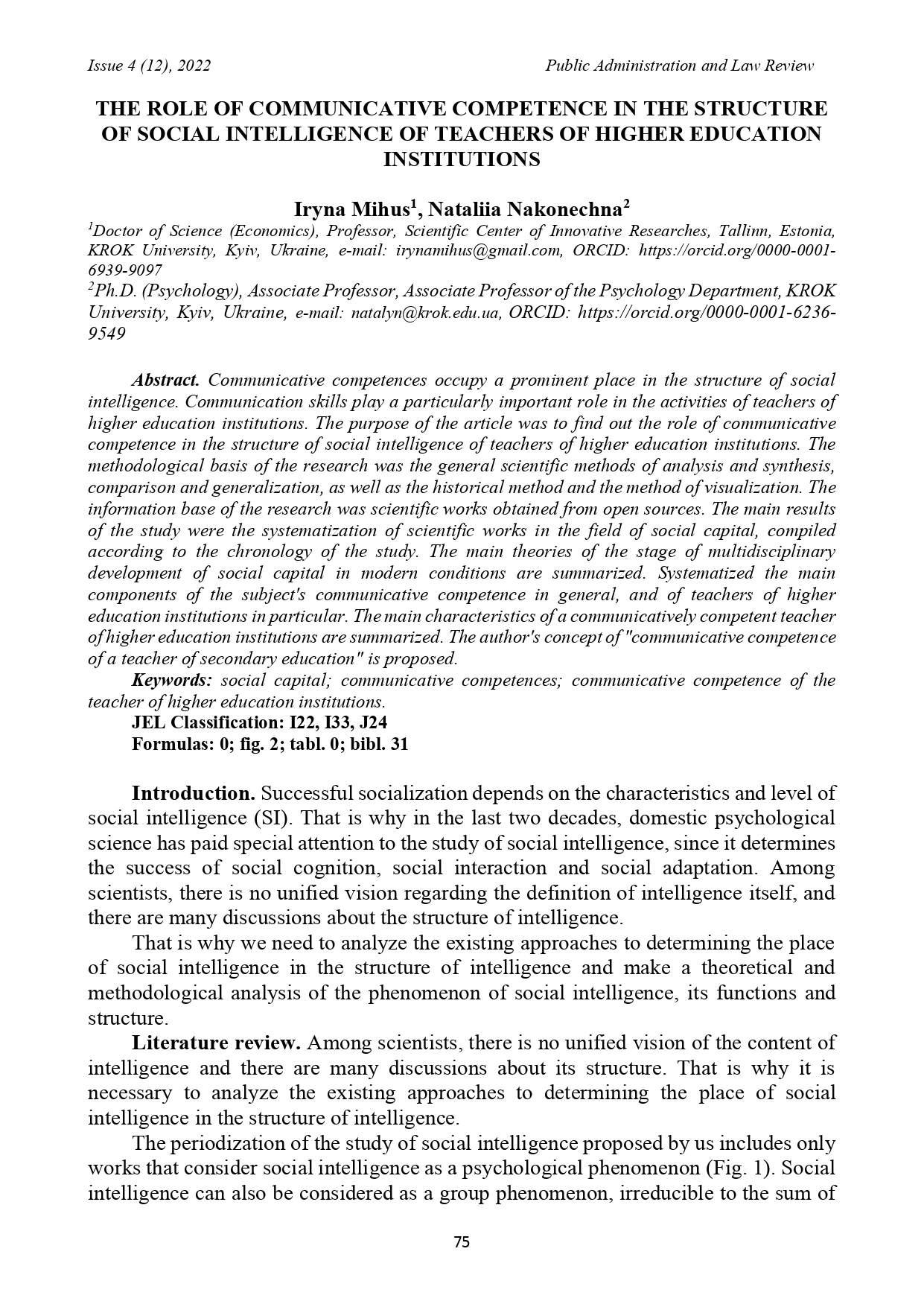THE ROLE OF COMMUNICATIVE COMPETENCE IN THE STRUCTURE OF SOCIAL INTELLIGENCE OF TEACHERS OF HIGHER EDUCATION INSTITUTIONS
DOI:
https://doi.org/10.36690/2674-5216-2022-4-75Keywords:
social capital, communicative competences, communicative competence of the teacher of higher education institutionsAbstract
Communicative competences occupy a prominent place in the structure of social intelligence. Communication skills play a particularly important role in the activities of teachers of higher education institutions. The purpose of the article was to find out the role of communicative competence in the structure of social intelligence of teachers of higher education institutions. The methodological basis of the research was the general scientific methods of analysis and synthesis, comparison and generalization, as well as the historical method and the method of visualization. The information base of the research was scientific works obtained from open sources. The main results of the study were the systematization of scientific works in the field of social capital, compiled according to the chronology of the study. The main theories of the stage of multidisciplinary development of social capital in modern conditions are summarized. Systematized the main components of the subject's communicative competence in general, and of teachers of higher education institutions in particular. The main characteristics of a communicatively competent teacher of higher education institutions are summarized. The author's concept of "communicative competence of a teacher of secondary education" is proposed.
Downloads
References
Thorndike E. Intelligence and its use. Harper’s Magazine. 1920. 140. P.227–234.
Vernon P. Some characteristics of the good judge of personality. Jornal of Social Psychology. 1933. №4. P.42-57.
Guilford J. The nature of human intelligence. New York: McGraw-Hill, 1967. 538 p.
Thorndike E. An evaluation of the attempts to measure social intelligence / R. Thorndike, S. Stein // Psychological Bulletin. –1937. –№34.– P. 275-285.
O’Sullivan M. Six factors of behavioral cognition: Understanding other people / M. O’Sullivan, J. Guilford // Journal of Educational Measurement.– 1975. – № 67. – P. 255 – 271.
Hendricks M. Measuring creative social intelligence: Psychological Laboratory reports / M. Hendricks, J. Guilford, R. Hoepfner. // Los Angeles:University of Southern California. – 1969. – №42.
Cantor N. Social intelligence / N. Cantor, J. Kihlstrom // Handbook of Intelligence / N. Cantor, J. Kihlstrom. – Cambridge, UK: Cambridge University Press, 2000. – (2-nd edition). – P. 359–379.
Ford M. A further search for social intelligence / M. Ford, M.Tisak // Journal of Educational Psychology. – 1983. – №75.– P.196 - 206.
Frederickson N. The place of social intelligence in taxonomy of cognitive abilities / N. Frederickson, S. Carlson, W. Ward // Intelligence. – 1984. – №8. – P. 315 – 337.
Lowman, R. L. & Leeman, G.E. The dimensionality of social intelligence: social abilities, interest, and needs / R. Lowman, G. Leeman // Journal of Psychology.– 1988. –№122. – P. 279–290.
Stricker, L. J. & Rock, D. A. Interpersonal competence, social intelligence, and general ability/ L. Stricker, D. Rock // Personality & Individual Differences. – 1996. – № 21. – P. 469–482
Gardner H. Frames Of Mind: The Theory Of Multiple Intelligences / H.Gardner. – New York, 2011. – (Basic Books. Third edition ). – 528p.
Cantor N. Prototypes in person perception / N. Cantor, W. Mischel //Advances in experimental social psychology / N. Cantor, W. Mischel. – New York: Academic Press, 1977. – (L.Berkowitz (Ed.). – P. 3–52.
Kosmitzki C. The implicit use of explicit conceptions of Social Intelligence / C. Kosmitzki, O. John. // Personality & Individual Differences. – 1993. – №15. – P. 11–23
Mischel, W. Toward a cognitive social learning reconceptualization of personality/ W. Mischel // Psychological Review. – 1973. – № 80.– P.252 –283.
Eysenck, H.J. (1970). The Structure of Human Personality (Psychology Revivals) (1st ed.). Routledge. https://doi.org/10.4324/9780203753439
Bar-On, R. (2005). The Bar-On model of emotional-social intelligence. In P. Fernández-Berrocal andN. Extremera (Guest Editors), Special Issue on Emotional Intelligence. Psicothema, 17. Available from: https://www.researchgate.net/publication/6509274_The_Bar-On_Model_of_Emotional-Social_Intelligence.
Mayer J. What is emotional Intelligence [Електронний ресурс] / J. Mayer, P. Salovey // Emotional development and emotional intelligence: Implicators for educators / P. Salovey, D. Sluyter (Eds.). – 1997. – Режим доступу до ресурсу: http://unh.edu/emotional_intelligence/EIAssets/EmotionalIntelligenceProper/EI1997 MSWhatIsEI.pdf.
Sternberg R. Inside Intelligence / R. Sternberg // Amer. Scientist. –1986. - № 74 (2). – P. 137–143.
Sternberg R. The triarchic mind: A new theory of human intelligence / R. Sternberg. – New York: Viking. Penguin Inc, 1988
Albrecht К. Social intelligence: The New science of success [Електронний ресурс] / К. Albrecht // Jossey-Bass: Business Book Review. – 2006. – Режим доступу до ресурсу: https://www.karlalbrecht.com/downloads/SocialIntelligenceBBR.pdf.
Goleman D. Emotional Intelligence / D.Goleman. – New York: Bantam Books. – 1995. – 368p.
Goleman D. Social Intelligence: the new science of leadership / D.Goleman. – New York: Bantam Books, 2006. – 416p.
Goleman D. Primal Leadership: Realizing the Power of Emotional Intelligence / D. Goleman, R. Boyatzis, A. McKee. – Boston: Harvard Business School Press, 2002. - 336p.
Goleman D. Social Intellegence and Biology of Leadership / D. Goleman, R. Boyatzis // Harvard Business Review, 2008. - №9. – P. 74–81.
Handbook for developing emotional and social intelligence : Best practices, Case studies, and Strategies / M. Hughes, H. L.Thompson, J. B. Terrell, editors. – 2009 – 450p
Yermentaeyeva, Ardakh, et al. "Social intelligence as a condition for the development of communicative competence of the future teachers." Procedia-Social and Behavioral Sciences 116 (2014): 4758-4763.
Wilkinson, L. C. (1983). Social Intelligence and the development of communicative competence. In Origins of Intelligence (pp. 305-326). Springer, Boston, MA.
Mykhalchuk, N., & Ivashkevych, E. (2018). Psycholinguistic features of the development of social intelligence of the teacher. Psycholinguistics, (23 (1)), 242-257.
Spitzberg, B. H. (2010). Axioms for a theory of intercultural communication competence. Enhance your intercultural communication learning experience!.
Rickheit, G., Strohner, H., & Vorwerg, C. (2008). The concept of communicative competence. Handbook of communication competence, 1, 15-62.

Downloads
Published
How to Cite
Issue
Section
License
Copyright (c) 2022 Iryna Mihus, Nataliia Nakonechna

This work is licensed under a Creative Commons Attribution 4.0 International License.





